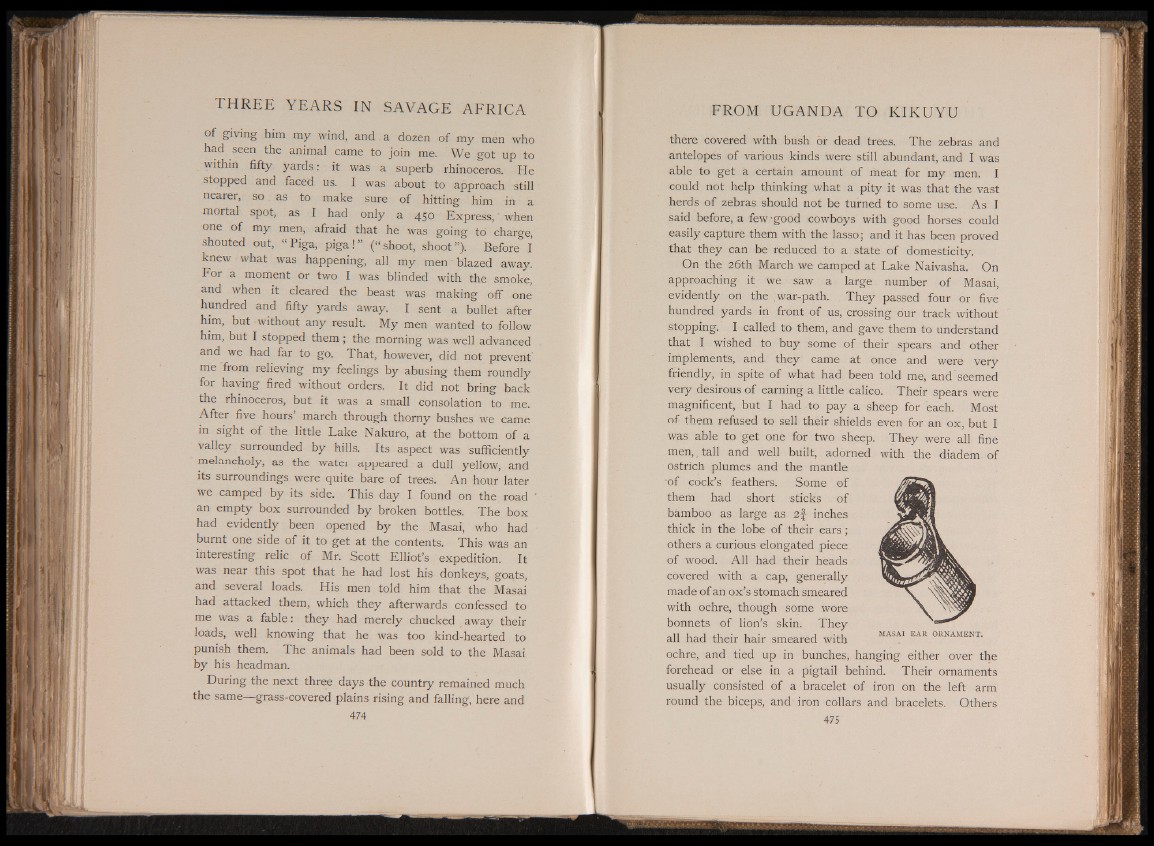
of giving him my wind, and, a dozen of my men who
had seen the animal came to join me. We got up to
within fifty yards: it was a superb rhinoceros. He
stopped and faced us. I was about to approach still
nearer, so as to make sure of hitting him in a
mortal spot, as I had only a 450 Express, when
one of my men, afraid that he was going to charge,
shouted out, “ Piga, piga!” (“ shoot, shoot”). Before I
knew what was happening, all my men blazed away.
For a moment or two I was blinded with the smoke,
and when it cleared the beast was making off one
hundred and fifty yards away. I sent a bullet after
him, but without any result. My men wanted to follow
him, but I stopped them ; the morning was well advanced
and we had far to go. That, however, did not prevent
me from relieving my feelings by abusing them roundly
for having fired without orders. It did not bring back
the rhinoceros, but it was a small Consolation to me.
After five hours’ march through thorny bushes we came
in sight of the little Lake Nakuro, at the bottom of a
valley surrounded by hills. Its aspect was sufficiently
melancholy, as the water appeared a dull yellow, and
its surroundings were quite bare of trees. An hour later
we camped by its side. This day I found on the road '
an empty box surrounded by broken bottles. The box
had evidently been opened by the Masai, who had
burnt one side of it to get at the contents. This was an
interesting relic of Mr. Scott Elliot’s expedition. It
was near this spot that he had lost his donkeys, goats,
and several loads. His men told him that the Masai
had attacked them, which they afterwards confessed to
me was a fable: they had merely chucked away their
loads, well knowing that he was too kind-hearted to
punish them. The animals had been sold to the Masai
by his headman.
During the next three days the country remained much
the same—grass-covered plains rising and falling, here and
474
there covered with bush or dead trees. The zebras and
antelopes of various kinds were still abundant, and I was
able to get a certain amount of meat for my men. I
could not help thinking what a pity it was that the vast
herds of zebras should not be turned to some use. As I
said before, a few-good cowboys with good horses could
easily capture them with the lasso; and it has been proved
that they can be reduced to a state of domesticity.
On the 26th March we camped at Lake Naivasha. On
approaching it we saw a large number of Masai,
evidently on the war-path. They passed four or five
hundred yards in front of us, crossing our track without
stopping. I called to them, and gave them to understand
that I wished to buy some of their spears and other
implements, and. they came at once and were very
friendly, in spite of what had been told me, and seemed
very desirous of earning a little calico. Their spears were
magnificent, but I had to pay a sheep for each. Most
of them refused to sell their shields even for an ox, but I
was able to get one for two sheep. They were all fine
men,, tall and well built, adorned with the diadem of
ostrich plumes and the mantle
■of cock’s feathers. Some of
them had short sticks of
bamboo as large as 2 f inches
thick in the lobe of their ears;
others a curious elongated piece
of wood. All had their heads
covered with a cap, generally
made of an ox’s stomach smeared
with ochre, though some wore
bonnets of lion’s skin. They
all had their hair smeared with masai ear ornament.
ochre, and tied up in bunches, hanging either over the
forehead or else in a pigtail behind. Their ornaments
usually consisted of a bracelet of iron on the left arm
round the biceps, and iron collars and bracelets. Others